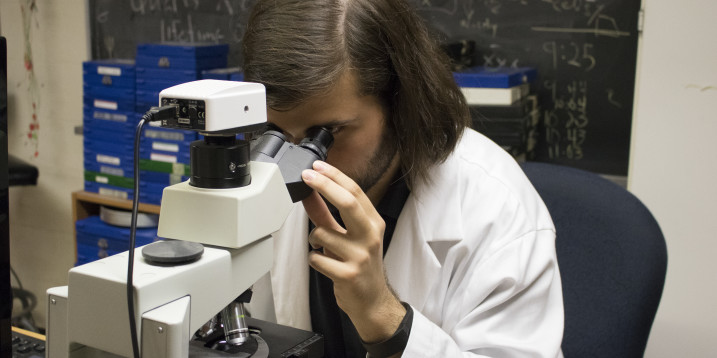By Kayla Perry, Editor-in-Chief
Several members of the Laurentian University research community, including seven faculty members and three graduate students, have been awarded research grants and scholarships totalling $1.329 million.
The Natural Science and Engineering Research Council of Canada (NSERC), a government funding organization that aims to support Canadian discoverers and innovators for the benefit of all Canadians, awarded all funding.
“We are extremely proud of the research profile achieved by our Laurentian faculty and graduate students,” said Laurentian University Vice-President, Research, Rui Wang. “Our success in winning NSERC funding is evidence of the high-calibre research being conducted in Biology, Medicine, Engineering, Earth Sciences and Human Kinetics, and we congratulate all of our award recipients.”
Among those who received NSERC funding was Nicolas Rouleau, a Laurentian University student pursuing his Ph.D. in Biomolecular Sciences.
Rouleau received $63,000, which will be awarded over three years.
“I’m interested in understanding the brain, and why it does what it does. I don’t think we understand it as well as we think we do – current models are interesting although flawed in many ways,” said Rouleau, who will use the award to fund his studies and allow maximum research time over the next three years.
“I’m really excited about this. As a graduate student, it’s always helpful to actually come (to the university) day in and day out and work on the project consistently, without having to worry about finding a way to support myself for the next little while.”
Rouleau also achieved his undergraduate degree and Masters degree at Laurentian, working with Dr. Persinger.
NSERC was founded in 1978: since its existence, the organization’s budget has grown from $112 million to a budget of $1.1 billion.
All Laurentian faculty awarded NSERC Discovery Grants are:
- Douglas Boreham, Faculty of Medicine: $170,000 (Biological Mechanisms Induced by Low and Ultra Low doses of Ionizing Radiation)
- Thomas Johnston, Department of Biology: $105,000 (Individual specialization and the trophic niche of aquatic consumers)
- Daniel Kontak, Department of Earth Sciences: $110,000 (Chemical fingerprinting of hydrothermal ore deposit systems)
- Tammy Eger, School of Human Kinetics: $110,000 (Modeling human response to foot-transmitted vibration)
- William Lievers, School of Engineering, $110,000 (Measuring and modelling the mechanical and failure behaviour of bone)
- Junfeng Zhang, School of Engineering, $22,000 (Blood Flows and Blood-Vessel Interactions in the Microcirculation)
- Zhibin Ye, School of Engineering, $200,000 (Developing semicrystalline star polyethylenes and advanced polyethylene ionomers)
In addition to his five-year Discovery Grant, Dr. Zhibin Ye was also awarded a Discovery Accelerator Supplement in support of his research, worth $120,000 over three years.
Three graduate students have also won graduate scholarships worth between $21,000 and $35,000 per year:
- Nicolas Rouleau, three-year Postgraduate Scholarship (Biology)
- Nirosha Murugan, three-year Postgraduate Scholarship (Biology)
- James Baxter-Gilbert, three-year Canada Graduate Scholarship (Biology)
